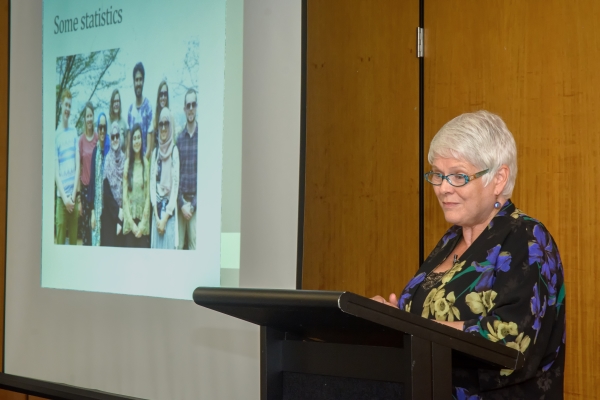Interfaith dialogue is becoming increasingly essential in today’s multifaith world and is actually revolutionising religion.
Interfaith Scotland director Dr Maureen Sier, who gave a public lecture on the topic of interfaith dialogue on March 27 in Auckland, said an uncomfortable truth societies face today is the diversity of religion. She belongs to the Baha’i faith.
“We inhabit a multi-faith world and this reality will increase as global migration — often due to international crises — creates an increasingly diverse world right on our doorsteps. And it is because of this increasingly multi-faith world that interfaith dialogue is essential,” she said.
Dr Sier said with dialogue, the different religions are revolutionised. Rather than diluting one’s faith when discussing another’s beliefs, a person engaging in interfaith dialogue is enriched.
“Engaging in dialogue really forces you to think about what you believe and why you believe it and this could be an astoundingly enriching experience,” she said.
The world is still predominantly religious not secular, she noted, citing a study done by the Pew Research Center in 2010.
The study revealed that eight out of 10 people identify with a religious group.
“That is 5.8 billion religiously affiliated children and adults around the globe, representing 84 per cent of the world population,” she said.
“Places like New Zealand and Scotland are actually in the minority when it comes to global statistics in that both countries have over 40 per cent of the population not religiously affiliated although a large number as well believe without belonging.
“So, despite 40 per cent not being religiously affiliated, 60 per cent are,” she pointed out.
However, she noted religion is increasingly being seen in a negative light.
“The current narrative is that religion is the cause of war, Islam is the biggest threat to our security, Christians are fundamentalists, religion is anti-gender equality and that basically, it is irrelevant,” she said.
“Sadly, that narrative is impacting on our young people who are very rarely given an alternative narrative. And so, in a way, they are throwing the baby out with the bath water and millennia of spiritual wisdom is being taken away from our children.”
Dr Sier said an alternative narrative can be glimpsed from the study undertaken by the Woolf Institute, a UK-based independent research organisation.
The study, titled “Trust in Crisis”, found faith communities to be “the root of a new kind of citizenship, crafted through trust and built in times of crisis that can cross all social boundaries. Such initiatives help energise and politicise the notion of citizenship by conducting quiet yet remarkable work that counters the shrill voices of exclusivist nationalism”.
Dr Sier said the Woolf Institute research recommended a greater appreciation of faith groups “as sources of trust and social cohesion”.
“I think the narrative that religions don’t work together [and] that religions are the cause of some type of problems needs to be countered with the reality on the ground,” she said.
Dr Sier said religions help in personal and spiritual growth as well as personal and societal salvation.
“[Religious people] kind of sense that there is more to life than just this,” she said.
These purposes of religion are deepened by interfaith dialogue.
“The paradigm of faith communities operating in isolation from each other is over,” Dr Sier said.
“Interfaith engagement models to future generations that religions can get on, that they’re happy to work together and that when there are differences in theology or understanding, they explore it through dialogue.”
Dr Sier said Interfaith Scotland promotes good relations through dialogue at every level of society.
“We support as much as we can the Scottish government to deliver on its [policy of] equality of religion and belief in Scotland.
“And we also engage in international projects because we have a sense in Scotland that you can’t really do this work in isolation,” she said.

Thanks for covering this in the Observer – it has now been shared widely in Scotland